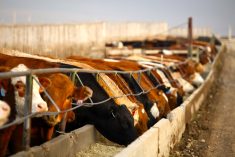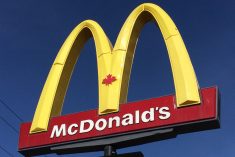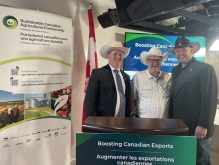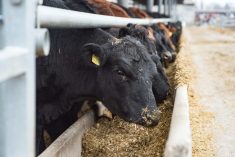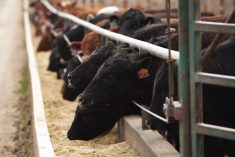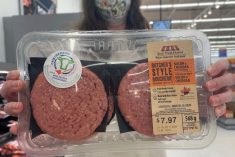CNS Canada –– McDonald’s plans on using sustainable beef by 2016, and intends on sourcing at least part of it from Canadian producers. The fast food giant’s latest step toward sustainability is to define what exactly that means.
Defining sustainability is important, according to a beef brand officer, because in some cases it’s something consumers want — in increasing amounts — though they don’t necessarily know what it is.
Beef consumers are moving away from traditional definitions when it comes to defining quality, industry experts say.
Read Also

JBS profit falls amid still-challenging US market environment
JBS, the world’s largest meat company, reported a net profit fall in the third quarter in spite of a rise in global net sales amid a still-challenging beef market environment in the U.S., according to an earnings statement on Thursday.
Consumers used to focus on marbling, but now they look for beef that can be described as wholesome, humanely raised, natural, organic and grass-fed.
But those words might not be the first that come to mind when consumers think about fast food.
That could change though, as McDonald’s plans to use verified sustainable sources starting in 2016, and will get a portion of that meat from Canadian producers.
“This sounds simple, but it’s actually a big challenge because there hasn’t been a universal definition of sustainable beef. That’s why we joined forces with other stakeholders to build coalitions and influence industry-wide change,” McDonald’s said on its website.
At the beginning of October, McDonald’s reached another level in its commitment to using sustainable beef.
McDonald’s came up with five indicator categories, and ranchers and processors have been testing the requirements in a pilot program, so far 34 have been verified.
Sustainability is something consumers want, even if they don’t necessarily know what it means.
“In many cases is it’s a buzzword instead of an actual thing you can rely on and measure, and be able to show results on, and show growth,” said James Bradbury, brand officer at Canada Beef. Bradbury has worked with McDonald’s on the Canadian Roundtable for Sustainable Beef.
As meat prices rise, so do consumers’ expectations about what they should be getting, he added. Consumers want to feel like they can trust the people that make their products.
“I think that there’s this high expectation that consumers have toward our industry. We need to do a better job of making sure we connect with them on it—on an emotional level.”
McDonald’s is just one of several companies working to deliver a product that is better, or perceived as better, for consumers or the environment.
A+W in 2013 launched its “Better Beef” TV commercials and a website that featured a few of the ranches it buys from. A+W promised to serve beef with no added hormones or steroids.
Many farmers were less than thrilled with the campaign, as A+W moved to sourcing some of its meat from outside Canada to fit those criteria.
Several articles written by farmers and those in the farming community accused the marketing campaign of fearmongering — but according to a representative from A+W, consumers liked the product.
Susan Senecal, chief marketing officer for A+W, last year said the campaign had exceeded expectations, including burger sales and customer feedback.
Sometimes consumers have a fundamental misunderstanding about beef products, said Brian Perillat, manager and senior analyst at CanFax.
“It’s unfortunate because today consumers are so far removed from agriculture, I think sometimes they get conflicting messages on what they’re wanting.”
He credited McDonald’s with trying to educate consumers in the process of its campaign, and said the company has been doing a lot to bridge the gap between consumers and producers.
“It’s a struggle we have. There seems to be a lot of negativity around agriculture, and our larger-scale production practices and science, there’s just so many conflicting messages out there. Producers get caught in the middle sometimes.”
— Jade Markus writes for Commodity News Service Canada, a Winnipeg company specializing in grain and commodity market reporting. Follow her at @jade_markus on Twitter.





